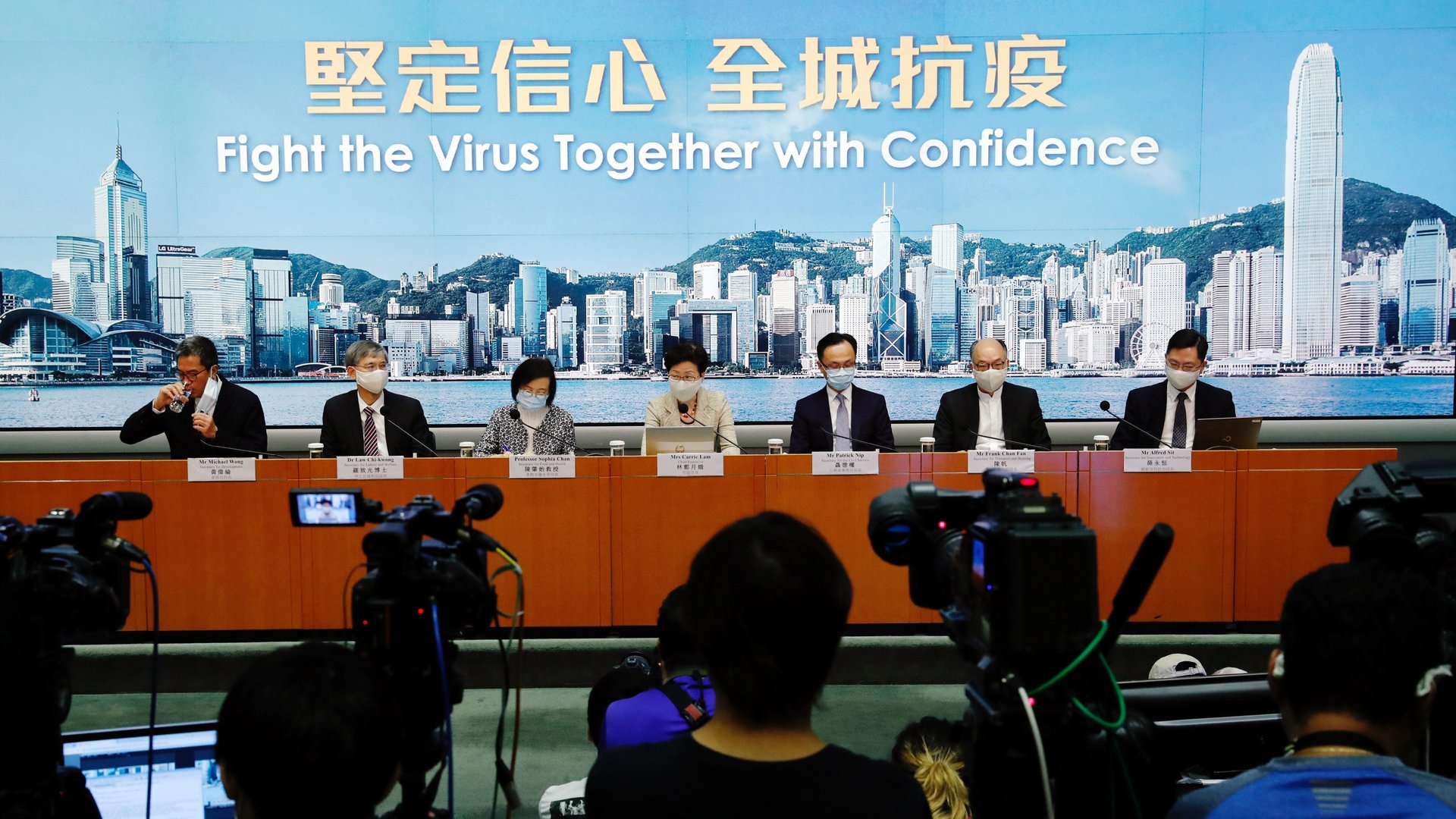Beijing’s push for mass Covid testing in Hong Kong commits the cardinal sin of public health
The first rule of how governments should deal with public health crises is to not mix it with politics. The Hong Kong government, however, has done just that.


The first rule of how governments should deal with public health crises is to not mix it with politics. The Hong Kong government, however, has done just that.
After weeks of heated debate about the efficacy of rolling out a universal coronavirus testing regime—at a time when new daily cases have fallen to low double digits and the reproductive number is below 0.5, meaning the outbreak is slowly petering out—the city’s leader Carrie Lam today slammed “so-called experts” for not fully backing the testing scheme, suggesting they’re politically motivated and conspiring to “smear” the local and Beijing governments.
That accusation carries all the more weight under Hong Kong’s newly authoritarian reality, where provoking by unlawful means “hatred” toward the government can amount to a crime of collusion with external elements, punishable by lengthy prison terms. That those same experts have played pivotal roles in steering Hong Kong’s highly successful pandemic response does not seem to matter. Lam’s allegations have already had an immediate chilling effect: a prominent public health expert who recently criticized the mass-testing scheme declined to comment on her remarks to Quartz for fear of drawing unwanted attention.
Numerous prominent public health experts have in recent days questioned the need for universal Covid testing, which the government has repeatedly emphasized is strictly voluntary and will be conducted with the support of the Beijing government. But despite a constant drumbeat from the authorities extolling the supposed virtues and urgency of such a testing scheme, they have so far failed to provide convincing answers to two key issues: effectiveness and trust.
First, it’s unclear what universal testing is meant to achieve. Mass testing at the early stages of an outbreak is undeniably helpful in identifying clusters and isolating cases, as South Korea’s success in quickly controlling outbreaks earlier in the year can attest. But Hong Kong has largely brought its latest outbreak under control after cases spiked in early July. Experts have cautioned that pouring resources into mass testing at this point is akin to “wasting bullets,” and a “scatter-gun approach” that costs “an enormous amount money to find mostly negative results.” And that’s not to mention the irony of postponing next month’s legislative elections supposedly over coronavirus concerns, only to urge 7 million people to converge on testing centers. Lam, however, has said that mass testing is less risky than millions going to the polls because it’s spread out over two weeks, rather than a single election day.
Then there’s the intractable issue of trust. There are widespread concerns among Hong Kongers that the Beijing-backed testing scheme is a convenient way to ferry reams of personal data into the hands of mainland Chinese authorities. Many also worry that the testing scheme is an elaborate excuse to obtain people’s DNA, which could then be fed into the central government’s database for biometric surveillance purposes. The Hong Kong government has denied these allegations. Still, it also doesn’t help that police have already collected DNA samples of people arrested under the city’s new national security law, further stoking fears that Beijing could set up a DNA database for Hong Kongers much like they have done with Uyghurs in Xinjiang. The government has also been pushing for a digital health code to ease cross-border travel, but critics have called it a “Trojan horse disguised as health policy” and another worrying development in creeping state surveillance.
Meanwhile, Hong Kong has had no trouble rapidly scaling up its testing capacity to combat the latest outbreak, tripling its tests from about 110,000 conducted in June to nearly 300,000 in July (pdf). But the fanfare with which China has sent a team of 60 medical officials to the city to help with testing, and a splashy new slogan at a recent government press conference calling on people to “fight the virus with central government’s full support,” have left people wondering whether there is a wholesale effort underway to rewrite the narrative of the city’s pandemic response to cast Beijing as a benevolent savior.